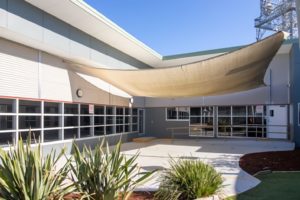
The Maribyrnong Community Residential Facility supports men who are exiting prison to find stable housing and employment prior to reentering the community
One of the key challenges experienced by people exiting the prison system is a lack of safe and secure housing. Nearly half of people who exit prison in Victoria do so into homelessness, and a 2019 snapshot of participants in Jesuit Social Services’ justice and crime prevention, and housing and complex needs programs found that 29 per cent of people were homeless.
Early on in the COVID-19 pandemic, Jesuit Social Services partnered with the Department of Justice and Community Safety to pilot an innovative temporary community residential facility in Melbourne, to prevent people from exiting prison into homelessness.
Initially established to stop the spread of COVID-19 in the community, the program – which provides wrap-around support as well as short-term housing – has made a big difference to the lives of vulnerable people.
“Pre-release, when we first meet with people, they’ve got big plans about the things they want to do differently this time. But when they are released, it can be very overwhelming. They are often going into crisis accommodation, or they are going into unsafe or unaffordable, unstable accommodation,” says Suzette James-Nevell, Manager – Adult Justice Programs at Jesuit Social Services.
“This pilot has been a really different experience for them, in that they have stability here. They have three meals a day, they have a roof over their head. They have an opportunity to save money, they’ve got our support on site where really experienced case managers can support participants to achieve their goals.”
The residential facility can house up to 44 people including people on parole and people who have recently exited prison.
Suzette says that access to housing – as well as support to secure longer-term housing and employment – has made a tangible, positive difference for participants.
“We are seeing excitement from people, as a few of these men have done the cycle of prison, to the community and back to prison for years. They’re really excited about doing something different and having a different outcome.
“It’s giving their families an opportunity to see that they’ve made a change or that they’re stable.”
Participant Christian (not his real name) says the support of staff at the facility has been crucial in helping him to turn his life around.
“They have not only provided me the environment to recover, but also enabled me to accelerate my ability and hope to return to a normal life and a career.”






